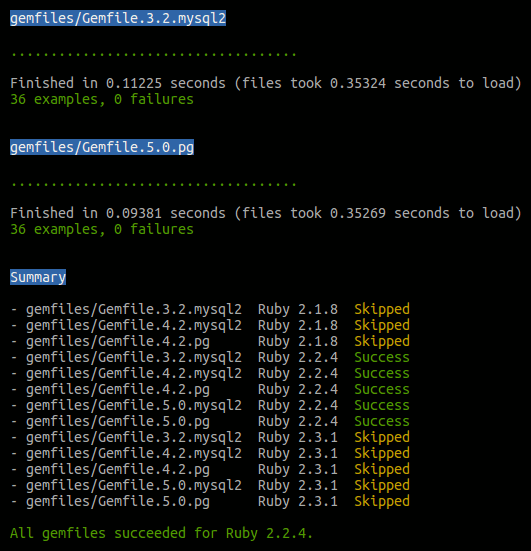README.md in gemika-0.1.4 vs README.md in gemika-0.2.0
- old
+ new
@@ -1,13 +1,17 @@
-# Gemika
+# Gemika [](https://travis-ci.org/makandra/gemika)
## Test a Ruby gem against multiple versions of everything
Gemika helps you test your gem against multiple versions of Ruby, gem dependencies and database types.
-Here's what Gemika can give your test's development setup (all steps are opt-in):
+
+## Features
+
+Here's what Gemika can give your test's development setup (all features are opt-in):
+
- Test one codebase against multiple sets of gem dependency sets (e.g. Rails 4.2, Rails 5.0).
- Test one codebase against multiple Ruby versions (e.g. Ruby 2.1.8, Ruby 2.3.1).
- Test one codebase against multiple database types (currently MySQL or PostgreSQL).
- Compute a matrix of all possible dependency permutations (Ruby, gem set, database type). Manually exclude incompatible dependency permutations (e.g. Rails 5.0 does not work with Ruby 2.1).
- Let developers enter their local credentials for MySQL and PostgreSQL in a `database.yml` file.
@@ -17,16 +21,25 @@
- Define an [ActiveRecord database migration](http://api.rubyonrails.org/classes/ActiveRecord/Migration.html) that sets up your test database.
- Automatically drop and re-create your test database before each run of your test suite.
- Configure RSpec to wrap each example in a transaction that is rolled back when the example ends. This way each example starts with a blank database.
-## Requirements
+## Compatibility
-- Gemika currently assumes you're testing with [RSpec](http://rspec.info/).
-- If you use any database-related features, you need `activaterecord` as a development dependency
+Gemika currently supports the following dependency versions:
+- Ruby: 1.8.7, 2.1, 2.2, 2.3
+- RSpec: Versions 1, 3
+- ActiveRecord: Versions 2.3, 3.2, 4.2, 5.0
+- Databases: PostgreSQL (with `pg` gem), MySQL or MariaDB (with `mysql2` gem)
+Gemika also makes some assumption about your Gem:
+
+- You're testing with [RSpec](http://rspec.info/).
+- If you use any database-related features, you need `activerecord` as a development dependency
+
+
## Example directory structure
Below you can see the directory of a gem with a completed Gemika testing setup. The next section describes how to get there:
```shell
@@ -42,17 +55,18 @@
.gitignore # Should ignore spec/support/database.yml
.travis.yml # Configures all tested Ruby / gemfile combinations, for both local development and Travis CI
my_gem.gemspec # Specification for your gem
Rakefile # Should require 'gemika/tasks'
README.md # README for your gem
-lib/my_gem.rb # Library files for your gem
+lib/my_gem.rb # Main file to require for your gem
lib/my_gem/my_class.rb # Class delivered by your gem
lib/my_gem/version.rb # Version definition for your gem
spec/spec_helper.rb # Requires 'gemika' and all files in support folder
-spec/support/database.rb # Calls `Gemika.rewrite_schema! { ... }`
-spec/support/database.yml # Local
-spec/support/database.travis.yml # Calls `Gemika.rewrite_schema! { ... }`
+spec/support/database.rb # Database schema for test database
+spec/support/database.yml # Database credentials for local development (not checked in)
+spec/support/database.sample.yml # Sample database credentials for new developers
+spec/support/database.travis.yml # Database credentials for Travis CI
spec/my_gem/my_class_spec.rb # Tests for your gem
```
For a live example of this setup, check the [makandra/minidusen](https://github.com/makandra/minidusen) repo.
@@ -62,15 +76,15 @@
### Have a standard gem setup
Gemika expects a standard gem directory that looks roughly like this:
+```shell
+my_gem.gemspec # Specification for your gem
+Rakefile # Rake tasks for your gem
+lib/my_gem.rb # Main file to require for your gem
```
-my_gem.gemspec # Specification for your gem
-Rakefile # Should require 'gemika/tasks'
-lib/my_gem.rb # Library files for your gem
-```
If you don't have a directory yet, you can [ask Bundler to create it for you](http://bundler.io/rubygems.html):
```
bundle gem my_gem
@@ -242,10 +256,12 @@
```
ln -s gemfiles/Gemfile.4.2.mysql2 Gemfile
ln -s gemfiles/Gemfile.4.2.mysql2.lock Gemfile.lock
```
+Note that since you now have a Gemfile in your project root, you will need to call `bundle exec rake` instead of `rake` from this point on.
+
Commit both `.ruby-version` and symlinks to your repo.
We recommend to setup Travis CI (see below) to check the entire test matrix after each push, even if a developer only tested with the defaults.
@@ -489,9 +505,31 @@
- Install development dependencies using `bundle matrix:install`
- Run tests using `bundle matrix:spec`
Note that we have configured Travis CI to automatically run tests in all supported Ruby versions and dependency sets after each push. We will only merge pull requests after a green Travis build.
```
+
+
+Development
+-----------
+
+Here are some hints when you try to make changes to Gemika:
+
+There are tests in `spec`. We only accept PRs with tests. To run tests:
+
+- Install Ruby 2.2.4
+- Create a local test database `gemika_test` in both MySQL and PostgreSQL
+- Copy `spec/support/database.sample.yml` to `spec/support/database.yml` and enter your local credentials for the test databases
+- Install development dependencies using `bundle install`
+- Run tests using `bundle exec rspec`
+
+We recommend to test large changes against multiple versions of Ruby and multiple dependency sets. Supported combinations are configured in `.travis.yml`. We provide some rake tasks to help with this:
+
+- Install development dependencies using `bundle matrix:install`
+- Run tests using `bundle matrix:spec`
+
+Note that we have configured Travis CI to automatically run tests in all supported Ruby versions and dependency sets after each push. We will only merge pull requests after a green Travis build.
+
Credits
-------
Henning Koch from [makandra](http://makandra.com/)